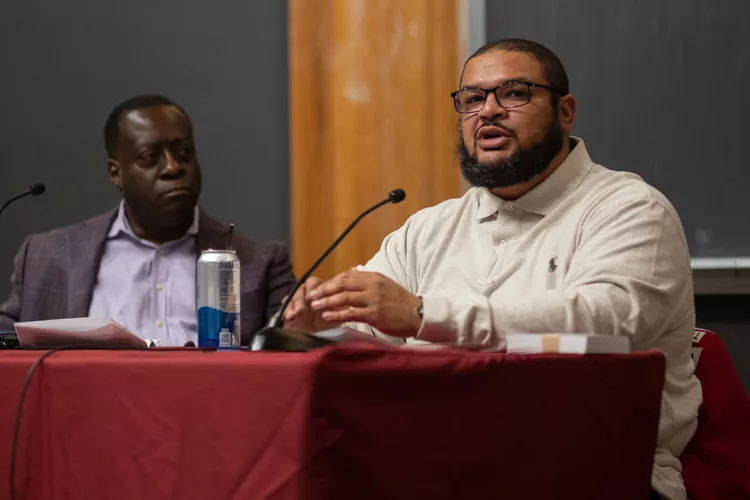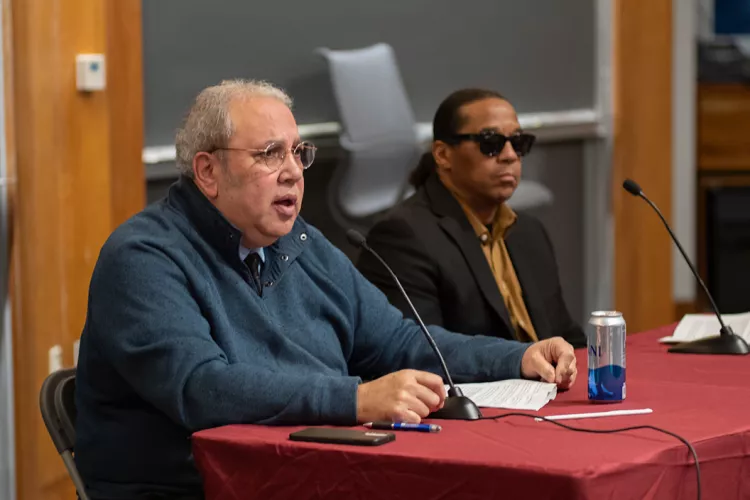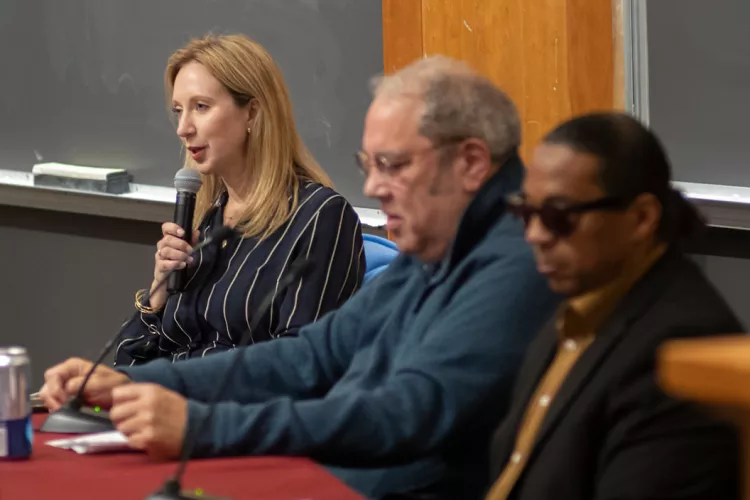“It’s Never Too Late for Justice”: Scholars, Community Activists Examine Juvenile Justice System

Professor of Political Science Keith Reeves ’88 (left) and Sergio Hyland, who studied in the Inside-Out program.
A group of scholars and community activists gathered in the Science Center for a panel discussion “Youth in the System: Why Juvenile Justice Needs Reform” at Swarthmore in December. They examined intersections of race, inequality, and mass incarceration in the U.S. for an engaged audience of faculty, students, and staff, sharing insights into the juvenile justice system as well as potential steps to improve it.
The event was presented by the Board of Managers’ Committee on Social Responsibility; chaired by attorney James Snipes ’75, P’21; and organized by fellow committee member Ben Berger, associate professor of political science and executive director of the Lang Center for Civic & Social Responsibility, and Keith Reeves ’88, professor of political science. Manager and New York State Inspector General Lucy Lang ’03, whose professional role has jurisdiction over the New York State Prison System, moderated.
“Our conversation tonight about this huge issue [of reforming juvenile justice] is going to be guided through a centurylong lens of a single case,” Lang said, “a local tragedy that is also a national and intergenerational tragedy.”
It centered on episode six of the podcast "The Arc Towards Justice," written and narrated by Jack Pokorny ’19 with production from Maggie O’Neil ’17 and Reeves.
The podcast tells the story of Alexander McClay Williams, a 16-year-old African American who became the youngest person to be executed in Pennsylvania. At age 12, Williams was accused of arson and placed at the Glen Mills Reformatory School for Boys, where he remained for six years before being falsely accused of the murder of Vida Robare, one of his primary caretakers. In 1931, following legal proceedings of less than five months, Williams was executed.
Samuel Michael Lemon, an author and educator and the great grandson of Williams’ defense attorney, brought the case to Reeves.
“It was natural for us to take the case,” said Reeves, who leads the Urban Inequality and Incarceration (UII) Program at the Lang Center. “We then tried to figure out how we could get this to a wider audience, and that led to the podcast, and to bringing together [various family members affected by the case].
“It’s been a really extraordinary honor,” Reeves added, “to be trusted with a story like this.”
Lemon, who wrote The Case That Shocked the Country, The Unquiet Deaths of Vida Robare and Alexander McClay Williams, has been fighting for decades for justice in the case. Those efforts included pressing the Delaware County District Attorney’s Office for trial transcripts.

Author and educator Samuel Michael Lemon (left) and Antonne Henshaw, a founding member of the New Jersey Scholarship and Transformative Education in Prisons Program.
“Frankly, they were heartbreaking to read,” Lemon said. “When you read about how they tried to frame this kid, without even trying to hide what they did, it was really saddening, maddening, and disappointing that the system could work so deliberately badly.”
Against the backdrop of the Williams case comes a recent statement from the ACLU: Almost 50 states have overhauled their juvenile justice laws, allowing more youth to be tried as adults and scrapping longtime protections to help rehabilitate delinquent kids and prevent future crimes.
Snipes later detailed his part-time efforts as a court-appointed special advocate for kids in the foster care system — often a first step in the school-to-prison pipeline.
“What I often see is kids of color victimized by trauma, going to schools, acting out, and being written off as oppositional,” said Snipes. “Then they’re diverted to special education, and often end up in residential treatment facilities where they endure the same kind of treatment.”
These and other themes of the discussion resonated with Sergio Hyland, who studied in the Inside-Out program with professors Berger and Reeves and has been working as a writer, organizer, and activist since he was released from State Correctional Institution Chester in February.
“No one is inherently evil, especially not a child,” said Hyland. “We need to remember that in poor communities of color, in particular, we don’t have the same social safety nets that more affluent communities have.”
Antonne Henshaw shared his story of being “literally thrown away” at age 17 — of going from no criminal record to serving 30 years to life in New Jersey State Prison. He spoke of “literally having to fight, every day,” for his life, and how that fight has reverberated.
“I felt deeply disturbed by surviving something that was meant to kill me, and that I could not move on with my life,” said Henshaw. “So I dedicated myself to helping people like me, and families of people like me, in my community.”
Henshaw, a founding member of the New Jersey Scholarship and Transformative Education in Prisons Program, and CEO and founder of the Transformative Justice Initiative (which partners with the Lang Center) expressed his frustration with structural impediments to reform.

New York State Inspector General Lucy Lang ’03 moderated the discussion.
“For a lot of the things that we're fighting, we're out-organized, because the people that want to maintain the current system, and the events and the mechanizations of the system, are very well-organized,” he said. “They understand exactly what they're doing, why they're doing it, and how to do it.”
Along that line, Delaware County First Assistant District Attorney Tanner Rouse implored the Swarthmore students in attendance to get involved in efforts like youth panels, diversion programs, and bail-review processes. These and other programs have helped the county cut its prison population by a third in recent years, he said.
“This is an open invitation and a challenge to everybody to not just be floored, to not just be kind of hopeful, to not just be angry, but to do something about it,” Rouse said.
The power of such action became evident last year, when a long-overdue chapter was added to Williams’ story. In June, a Delaware County judge granted a motion for a new trial, with the packed courthouse “erupting in applause,” says Lemon. Then the District Attorney’s Office opted not to pursue a trial and dropped the charges.
Then in August, Williams’ supporters and family received a special proclamation from the office of then-Pennsylvania Governor Tom Wolf, acknowledging the wrongful conviction of Williams and apologizing for his wrongful execution.
“I hadn’t expected it to be such an emotional event, full of tears,” said Lemon. “But it was just a deeply moving experience, to witness this sort of intergenerational healing.
“And it shows that it’s never too late for justice.”
The event was the third in a series presented by the Board of Managers’ Committee on Social Responsibility to engage the College community in thinking together about what it means to live, work, and lead in a multi-racial, diverse, and inclusive democracy. It was co-sponsored by the President's Fund for Racial Justice. The next event in the series, Telling Our Stories: Amplifying Indigenous Voices In North America, will take place on Tuesday, Feb. 21, at 7 p.m. over Zoom.



